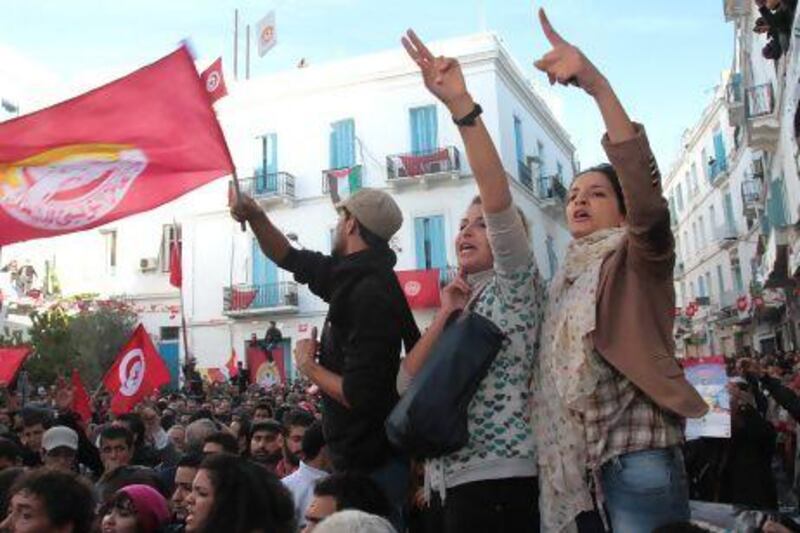Rising social tension in postrevolutionary Tunisia was on the minds of two men from different backgrounds as they sat on a cafe terrace overlooking the Gulf of Tunis.
One was a retired railway machinist, the other the nephew of Tunisia's founding president, Habib Bourguiba.
"Look at that house," said the pensioner, Moncef Rahmene, 65, lowering his shisha pipe to point at a building beside the Cafe des Nattes. "If it fell into disrepair, it would take time to rebuild.
"That's true of our country, too. People want everything too quickly. The government needs breathing space to do its work."
Lotfi Bourguiba, discussing the same issues a little earlier, had said: "Our democracy is young, in its apprenticeship. It is not surprising that people should be impatient but we now have freedom of expression, including the right to change our leaders if we do not like what they do."
Tunisia is approaching two momentous anniversaries.
Before the Arab Spring, there was the Arab winter. On December 17, 2010, Mohamed Bouazizi, a fruitseller in the town of Sidi Bouzid, set fire to himself in protest at local bribery and corruption.
His gesture came to symbolise the country's "jasmine revolution" and became a catalyst for democracy movements that swept across parts of the Arab world. He died two-and-a-half weeks later and, on January 14, 2011, the regime of Zine El Abidine Ben Ali was overthrown.
Both Mr Rahmene and Mr Bourguiba welcomed the end of the dictatorship. However, both argued against wholesale demonisation of Ben Ali - who seized power in 1987 by deposing the ailing Bourguiba. They recognised that he did "good as well bad things" but was undone in large measure by the corrupt actions of family members.
If Tunisians are unrealistic in demanding swift improvement in their daily lives, their country cannot be said to be at peace with itself.
Tomorrow, the main union will stage a general strike in protest at attacks by Islamist militants belonging to groups calling themselves defenders of the revolution. The day of action had been due to coincide with a visit by the US secretary of state, Hillary Clinton, for a conference on the region's future with delegates from the Middle East, North Africa and the Group of Eight economic powers.
Mrs Clinton has now withdrawn because of illness, but the summit takes place against a background of the grave unemployment crisis at the heart of the host country's unrest. Wages for many of those working are low and, despite the revolution, corruption has increased, pushing Tunisia 16 places lower, to 75th, in world rankings.
From the newly aggressive media come shrill warning signals: "Country on the edge of the precipice", ran a front-page headline in the French-language La Presse de Tunisie.
With his monthly pension of 800 dinars (Dh1,865), Mr Rahmene is content. Others are less satisfied. "Life is no better. The country is in a mess," said a Tunis shopkeeper attending a festival of camel and horseriding in the southern town of Douz, gateway to the Sahara.
The clashes between radical elements and trade unionists - who have been marking the 60th anniversary of the killing of Farhat Hached, a pre-independence union leader, by French colonialists - are symptomatic of the widespread disenchantment.
In the northern town of Siliana, 200 people were injured last month when police opened fire with lead pellets on a rally of thousands of people angered by unemployment.
The government, a coalition led by the moderate Islamist Ennahda party, is in disarray with speculation that a cabinet reshuffle could even topple the president, Moncef Marzouki.
And official attempts to downplay extremism have been undermined by isolated violence. This week, a Tunisian border guard was killed in exchanges with an armed group in the region of Kasserine, close to the Algerian border.
The tourism minister, Elyes Fakhfakh, anxious to maintain the industry's recovery from its dramatic slump after the revolution, insists the country offers an overwhelmingly tranquil holiday destination.
He reinforced the point when leading a group of ambassadors and journalists on a whistle-stop tour of inland tourist sites in southern Tunisia. "We promise visitors history, a warm welcome and well-being," he said.
And he said holidaymakers were already returning, this year's figures showing a rise to within one million of the 2010 level of seven million after last year's 40 per cent decline.
The closure of many businesses in the uncertainty and confusion that followed the revolution underlines the need for tourism to regain its vital role.
A major source of concern is the army of well-educated young people without work or forced into unskilled employment.
But there are positive glimmers. In the capital, Rachida, 27, unemployed for five years after graduating, said the revolution had enabled her finally to find a government job. He brother was also now working, in a ceramics factory.
Whoever leads Tunisia in the next phase of its reconstruction needs more stories like Rachida's, and less evidence of lingering corruption, to show the world Mohamed Bouazizi's sacrifice was not in vain.






